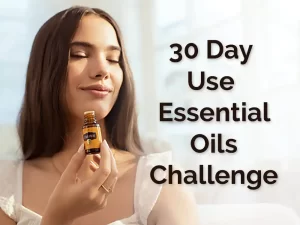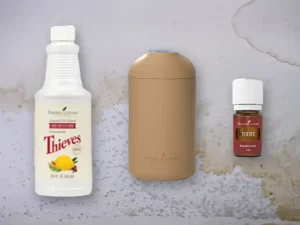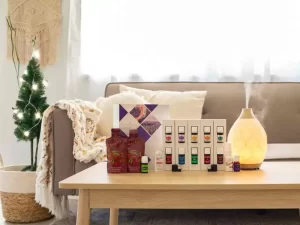People often ask me “Are essential oils safe?” The answer isn’t as simple as yes or no. They can be for certain people and not for others. It comes down to three things:
- how you use the essential oil,
- if you have any particular health issues and
- the quality of the essential oils you are using.
Let’s take a look at these issues and discover how you can use essential oils safely.
1/ Are essential oils safe? It depends how you use a particular essential oil
The first thing I always ask people is, “Have you read the label?” Nine times out of ten they haven’t. Many people assume that because something is natural it is therefore safe. Mercury and arsenic are ‘natural’, but they are far from safe.
Rule #1 – you should always read the individual product label directions before using any essential oil and remember that if you do have any health challenges and if any symptoms persist, always consult with a health professional.
People should only use some essential oils aromatically, as they irritate the skin, while it’s best to use others topically. Some essential oils can be used in food or drinks and others can’t. Others require dilution while there are some that can be used undiluted (neat). All of this will be on the label.
So, if you read the label and use them only in the ways recommended, this will decrease any risks associated with using that particular essential oil. However, this still doesn’t necessarily make it safe.
2/ Are essential oils safe? It depends on your particular health issue.
When you SHOULDN’T use an essential oil
There are some times and some reasons when you should not use a particular essential oil because under the circumstances there’s a risk of them having a negative effect. These reasons are known as ‘contraindications’.
Contraindications
If you have a medical condition it is best to speak to a health professional before using essential oils. In some cases, such as high blood pressure, epilepsy, pregnancy or if you’re on blood thinning medication, some essential oils are contraindicated. Even when using blends of essential oils, check which single essential oils are in the blend and whether they may be contraindicated.
An example of this is a Young Living blend called Panaway. One of the single essential oils in this blend is Wintergreen. It should not be used by people on blood thinning medication.
Using Essential Oils Safely During Pregnancy
You can use essential oils safely during pregnancy and while nursing, and many people do! I certainly did. But, as with anything you take and use when you are pregnant, we strongly recommend that you work with a trained health professional. One who is experienced with essential oils, as there are some essential oils that you really shouldn’t use while pregnant or breastfeeding. As a general rule, I only used essential oils when I needed them during pregnancy and I diluted them.
I have an online class that you can check out on using essential oils during pregnancy and labour. To watch this free video, click the link here.
Skin Irritation
Essential oils are very potent and some may be irritating to the skin, particularly what we call ‘hot oils’. Hot oils are oils that can cause a hot or warming sensation when applied to the skin. Examples of hot oils and blends include Cinnamon Bark, Clove, Lemongrass, Oregano, Thyme and Thieves®. For some people, Peppermint’s cooling sensation can be too intense.
Young Living recommends using a patch test procedure prior to first use. To perform a patch test, apply 1–2 drops of essential oil to a patch of skin such as the forearm. Observe that area of skin over the course of 1–2 hours for any noticeable reaction; however, reactions occur usually within 5–10 minutes. If you experience a hot or burning sensation or develop a rash, add V-6 or another carrier oil to the affected area as often as needed.
If discomfort or irritation occurs from any essential oil, stop using the essential oil. Then apply V-6 or another carrier oil to the affected area. Oils are attracted to fat; if you try to wash them off with water, the oil will only drive deeper into the skin. If a rash occurs, this may be a sign that the essential oil is interacting with something that is under the skin, such as a chemical the body has stored there previously. Drink adequate water to encourage the release and removal of toxins in your body. Before using the essential oil again, perform a patch test and dilute with a carrier oil as needed.
For more about skin irritation and essential oils check out my my post ‘Can you be allergic to essential oils?‘
Using essential oils safely with the young or elderly
It’s a good idea to dilute essential oils when using them with children or the elderly and putting oils on their feet is one of the best places to apply them. Also, I never recommend using Peppermint or Eucalyptus (or blends containing these) with children under 2 as it may cause respiratory distress. Although this is very rare, we wouldn’t want to risk this with a child. For children over 2 and under 6 I don’t recommend using these two essential oils above the shoulders, again to lessen any risk of causing respiratory distress.
We all want to ensure that we’re using oils safely, especially with our kids. I have a specific post where you can read more about using essential oils safely with children. Check out ‘Are essential oils dangerous for children?‘
Photosensitivity
Some essential oils, especially citrus oils, contain natural molecules that react with sunlight (UV light) and cause a sensitivity reaction. These are citrus oils like Lemon, Lime, Orange, Tangerine, Bergamot, Grapefruit, and blends that contain these oils such as Peace and Calming and Thieves. Young Living labels have a warning for all essential oils that carry this risk, including a recommendation to avoid sun and UV rays for 12–48 hours. Young Living formulates its beauty and cosmetic products to remove sun-sensitising agents to reduce the risk of sun sensitivity. or more on photosensitive check out the blog post ‘What is Photosensitivity?‘
Expiration
Most pure essential oils are amazingly stable and can last many years without breaking down or changing in aroma or chemical composition. However, some essential oils—such as Tea Tree and citrus oils—are more prone to oxidation. The general rule, as with most things in life is – if it smells off then it probably is off and you shouldn’t use it. You can extend the life of your essential oils by protecting them from heat and sun exposure.
Storage
Always store essential oils and products that contain essential oils in amber glass containers to protect them for years to come. You should never, ever place your oils in a plastic container. The essential oils, especially citrus oils, will eat through the plastic. You may also hear someone say that, “Well, if the oils eat through plastic, can you imagine what they’re doing to your body?” The problem with this “logic” is that humans are not made of the same chemical composition as plastic (thank goodness!). That kind of scaremongering is like comparing apples with (plastic) oranges.
Drip stopper
You will notice a drip stopper in the top of most essential oil bottles. This helps to measure out the oils in drops and to stop children being able to easily drink the oils. I only buy essential oils that have this drip stopper.
Internal Use
For more information on this refer to our post on using essential oils – in food and drink.
Where can’t you use essential oils safely?
There are 3 places on your body that you shouldn’t put essential oils. Does anyone want to hazard a guess where they are?
The short answer is – eyes, ears and genitals. in other words, basically anywhere there is a mucous membrane.
3/ Are essential oils safe? It depends on the Quality of the essential oils you are using
Quality really does matter when it comes to essential oils.
Adulterated essential oils, as I’ve discussed previously, can cause a lot of problems when used aromatically, topically and especially in cooking. That’s just one of the reason’s why I only use and recommend Young Living Essential Oils. To see the other reasons check out ‘Which essential oils do I recommend?‘
Get started using essential oils in your home
Do you want to feel better? Physically and mentally?
If so then my next question is – what are you doing to change things so you do feel better? Things won’t change for you unless you make a change.
It’s incredible just how much introducing safer, more natural alternatives can heal your mind, body & soul! I used to be so skeptical if essential oils could really change my life for the better, but now I’ve seen it all first-hand! To start with I only appreciated the physical differences essential oils made like panaway on my lower back after hours of driving or sitting at a computer or tranquil roll on to help me sleep. But after a while I began to see the impact they were having on my emotions and on how I felt mentally. I was happier and felt less anxious all the time.
The most amazing part about essential oils is that you can use them for SO many different things. Whether you’re feeling really stressed & overwhelmed, or need help getting a good night’s sleep, using an essential oil could be that solution you’ve always been looking for!
I’d love for you to be taking this journey with us, and it would be my absolute honour to be able to help guide you in any way, shape or form on your essential oil journey. We gift all new oilers with a welcome pack full of goodies to help you get started using your essential oils quickly, easily and most importantly safely. Plus we offer the best essential oil education you’ll find anywhere (just check out this website and our YouTube channel if you need proof of that). Take the leap – get started today – we will catch you. Learn more about getting started by clicking the link below.










 Subscribe to Hot Oily Mumma
Subscribe to Hot Oily Mumma